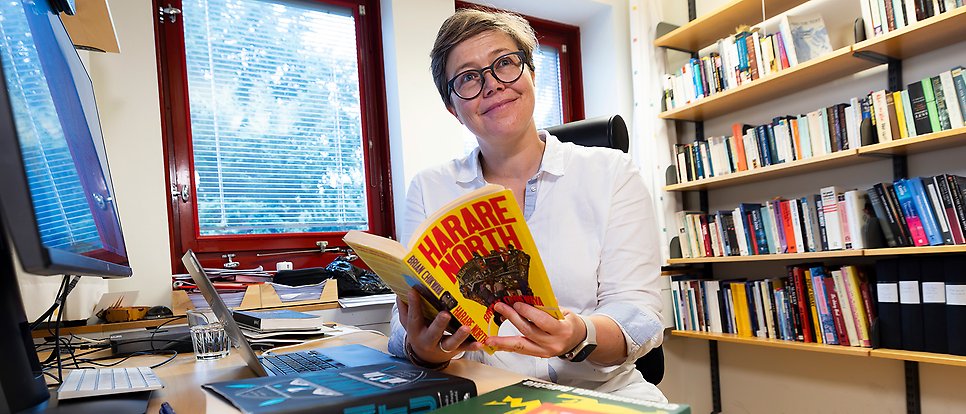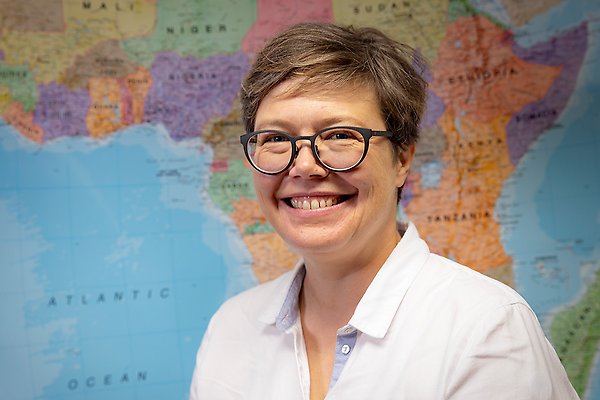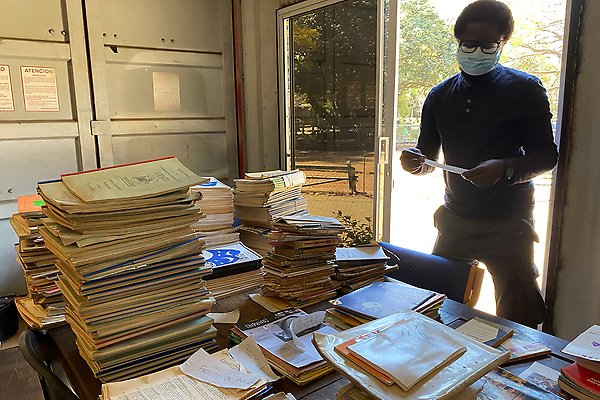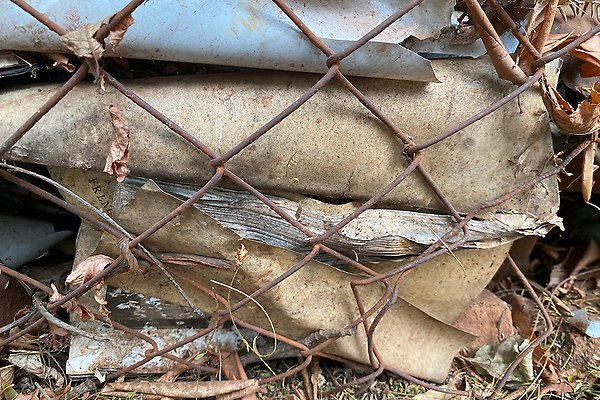New database aims to give African literature visibility

Over a five-year period, together with her research team, Ashleigh Harris will create an open online database and catalogue thousands of works of literature from all over Africa. Photo: Mikael Wallerstedt
“There’s so much literature that ought to be seen,” says Ashleigh Harris, Professor of English. Harris is leading an innovative digitisation project at Uppsala University. The goal is to catalogue thousands of literary works in African languages that currently lack visibility outside Africa.
When Ashleigh Harris teaches African literature, she notices great gaps in students’ knowledge. The works that circulate globally are generally written for a non-African audience by Africans living in Europe or America. But what do Africans themselves read?
The answer, to a great extent, is unpublished literature, literature spread via filmed readings, theatre performances and blogs.
“There’s a kind of invisibility of so much material that reproduces all kinds of stereotypes about Africans not reading. It’s complete nonsense. But if you want to introduce your students to, for example, the Zimbabwean theatre there’s so little available online,” Harris says.

"It’s about expanding the visibility of what is actually already there," says Ashleigh Harris. Photo: Mikael Wallerstedt
In September she started a large-scale digitisation project, with support from the European Research Council (ERC). Over a five-year period, together with her research team, she will create an open online database and catalogue thousands of works of literature from all over Africa.
Absent in global catalogue
Harris has identified a major problem: most of the literature produced on the African continent cannot be found in the online global catalogue WorldCat, which is used by libraries around the world.
“In Africa, the formal publishing industry is almost non-existent. Very often, African writers self-publish and oral or spoken forms are more common across the entire continent. But they lack ISBN numbers and standardised metadata, and therefore become invisible.”
Works in the thousands of different African languages also fall outside the frame. Moreover, oral genres such as poetry, storytelling and theatre often lack written transcripts. This distorts the image of African literature and how it is perceived globally, Harris says.
“This makes it urgent to save the cultural heritage before it disappears.”
New model for metadata
The database will contain basic metadata – author, title, language, genre etc. – and links to archives holding the works. By using African genre terms instead of European terms, Harris hopes to capture the cultural contexts more adequately.

Pedzisai Maedza working at Theatre in the Park, Zimbabwe. The researchers catalogued their archive. Photo: Ashleigh Harris
Gathering the information requires a great deal of fieldwork. The research team consists of language experts who are identifying archives and unpublished manuscripts and talking with authors. They are then digitising and documenting what they find – initially in 14 or 15 different languages.
“In one archive we found 250 undocumented theatre scripts by Zimbabwe’s best-known playwrights and writers. And we just wrote down some basic metadata,” Harris continues. “It’s about expanding the visibility of what is actually already there.”
Rescue operation for cultural heritage
In Harare, the capital of Zimbabwe, they found valuable texts in very poor condition. Handwritten manuscripts lay scattered in containers and were being gnawed to pieces by rats. Harris describes her work as a rescue operation to preserve cultural heritage.
“Hopefully, our work with the database will have the effect that people will start to protect these texts better and keep their metadata up to date, when they realise the value of it,” Harris says.
She hopes that when scholars start seeing what’s available, they will be encouraged to consult the material in African archives.

A destroyed archive: rotting manuscripts from the National Theatre Organisation of Zimbabwe. Photo: Ashleigh Harris
When the multilingual database is launched, the aim is to make it open for everyone to access. Harris hopes that it will change how African literature is studied and taught throughout the world.
“We’re coming up with a kind of standard system that will allow anybody to put information into our online database. It’s a sort of crowdsourcing project, mostly for scholars and academics across the African continent.”
Annica Hulth
Metadata for African literature
- The project Almeda: African Literary Metadata is financed by ERC, the European Research Counsil.
- The project will produce new metadata for African literature, which unlike previous, colonial systems does not focus on books. It also includes less formal literary forms, such as spoken-word poetry, street theatre, and a variety of online genres.
- The goal is to make African literature more searchable, by creating and linking metadata.
